Goal Training Options:
Well-rounded Training Levels,
intensive workshops,
or
"a la carte" workshops.
Your choice.
We offer 20 RPG Professional training levels, as well as 1-off specializations.
You can either go through our proven level progression series of programs, or if you have more experience and just need specific areas filled, attend specific training series and workshops a la carte.
Fast Foundation Building: Intensive Workshops Approach
If you are already a professional in your field of choice, and you are looking to evaluate whether role-playing games would be a good fit to add to your professional development, the best approach is to take one of our 1-day Intensive Introductory Workshops For Professionals first.
Fundamental Intensive Workshops list (1 full day each)
-
Intro 1 for all professionals & laypersons (must take this workshop before taking the other more specialized workshops in this series)
-
Intro 2 for recreational professionals
-
Intro 3 for recreational & entertainment professionals
-
Intro 4 for educational professionals
-
Intro 5 for therapeutic & medical healthcare professionals
Novice Intensive Workshops list (2-5 half-days each)
-
Novice 1 for all professionals & laypersons (must take this workshop before taking the other more specialized workshops in this series)
-
Novice 2 for recreational professionals
-
Novice 3 for recreational & entertainment professionals
-
Novice 4 for educational professionals
-
Novice 5 for therapeutic & medical healthcare professionals
Intermediate Intensive Workshops list (2-5 full-days each)
-
Intermediate 1 for all professionals & laypersons (must take this workshop before taking the other more specialized workshops in this series)
-
Intermediate 2 for recreational professionals
-
Intermediate 3 for recreational & entertainment professionals
-
Intermediate 4 for educational professionals
-
Intermediate 5 for therapeutic & medical healthcare professionals
Intermediate Intensive Workshops list (3-5 full-days each)
-
Intermediate 1 for all professionals & laypersons (must take this workshop before taking the other more specialized workshops in this series)
-
Intermediate 2 for recreational professionals
-
Intermediate 3 for recreational & entertainment professionals
-
Intermediate 4 for educational professionals
-
Intermediate 5 for therapeutic & medical healthcare professionals
Advanced Intensive Workshops list (5 full-days each)
-
Advanced 1 for all professionals & laypersons (must take this workshop before taking the other more specialized workshops in this series)
-
Advanced 2 for recreational professionals
-
Advanced 3 for recreational & entertainment professionals
-
Advanced 4 for educational professionals
-
Advanced 5 for therapeutic & medical healthcare professionals
Get the Pieces Quickly: A la carte Specialty Workshops
<details coming soon!>
Facilities specialization:
<more details coming soon>
Population specialization:
ADHD for educators & therapists
Anxiety & panic disorders, including agoraphobia and social anxiety disorders, for therapists.
ASD/PDD for educators & therapists
Brain Injury patients for educators, medical, therapists, & other healthcare professionals
Depression for therapists
<more coming soon>
The Most Well-Rounded Approach: Training Levels
If you are wanting to start training from scratch along one of the 5 pathways (layperson, recreational professional, entertainment professional, educational professional, or therapeutic professional), and have the time and resources, following this approach for "levels" of training will provide the most well-rounded professionals that really want to Subject Matter Experts (SME)s on the topic of role-playing games and their best applications.
Categorizing the training levels grouped according to the National Institute of Health's (NIH) Proficiency Scale is illustrated in the diagrams below.
Source: https://hr.nih.gov/working-nih/competencies/competencies-proficiency-scale
They are rated on a scale of 1 through 5:
1. Fundamental Awareness (basic knowledge).
-
Focus is on learning.
-
Common knowledge or understanding of the basic techniques and concepts.
2. Novice (limited experience).
-
Focus on developing through on-the-job experience;
-
Level of experience gained in a classroom and/or experimental scenarios or as a trainee on-the-job. Expected to need help when performing this skill.
-
Understand and can discuss terminology, concepts, principles and issues related to this competency;
-
Utilize the full range of reference and resource materials in this competency.
3. Intermediate (practical application).
Able to successfully complete tasks in this competency as requested. Help from an expert may be required from time to time, but you can usually perform the skill independently.
-
Focus is on applying and enhancing knowledge or skill;
-
Have applied this competency to situations occasionally while needing minimal guidance to perform successfully;
-
Understand and can discuss the application and implications of changes to processes, policies, and procedures in this area.
4. Advanced (applied theory).
You can perform the actions associated with this skill without assistance. You are certainly recognized within your immediate organization as "a person to ask" when difficult questions arise regarding this skill.
-
Focus is on broad organizational/professional issues;
-
Have consistently provided practical/relevant ideas and perspectives on process or practice improvements which may easily be implemented;
-
Capable of coaching others in the application of this competency by translating complex nuances relating to this competency into easy to understand terms;
-
Participate in senior level discussions regarding this competency;
-
Assist in the development of reference and resource materials in this competency.
5. Expert (recognized authority)
Known as an expert in this area. You can provide guidance, troubleshoot and answer questions related to this area of expertise and the field where the skill is used.
-
Focus is strategic;
-
Demonstrated consistent excellence in applying this competency across multiple projects and/or organizations;
-
Considered the “go to” person in this area within NIH and/or outside organizations;
-
Create new applications for and/or lead the development of reference and resource materials for this competency;
-
Able to diagram or explain the relevant process elements and issues in relation to organizational issues and trends in sufficient detail during discussions and presentations, to foster a greater understanding among internal and external colleagues and constituents.
Note that this is a grossly oversimplified summary, and that all 5 proficiency levels may be achieved in some areas withing a single RPG Professional training level. But these diagrams should help people gain some sense of the relative expertise in the progression overall.
Fundamental (Basic Knowledge)
Beginning Laypersons & All Beginning Professionals (levels 1-3)
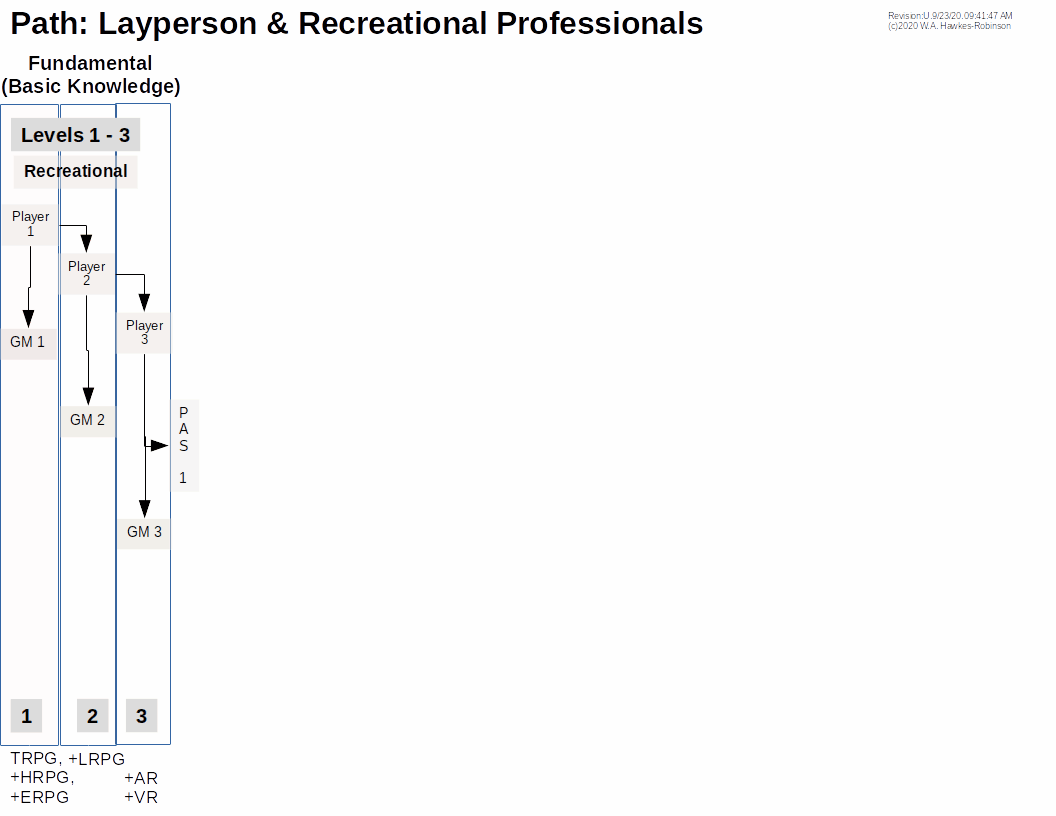
Novice (Limited Experience)
Intermediate Laypersons, & Novice Recreational & Entertainment professionals (levels 4-6).
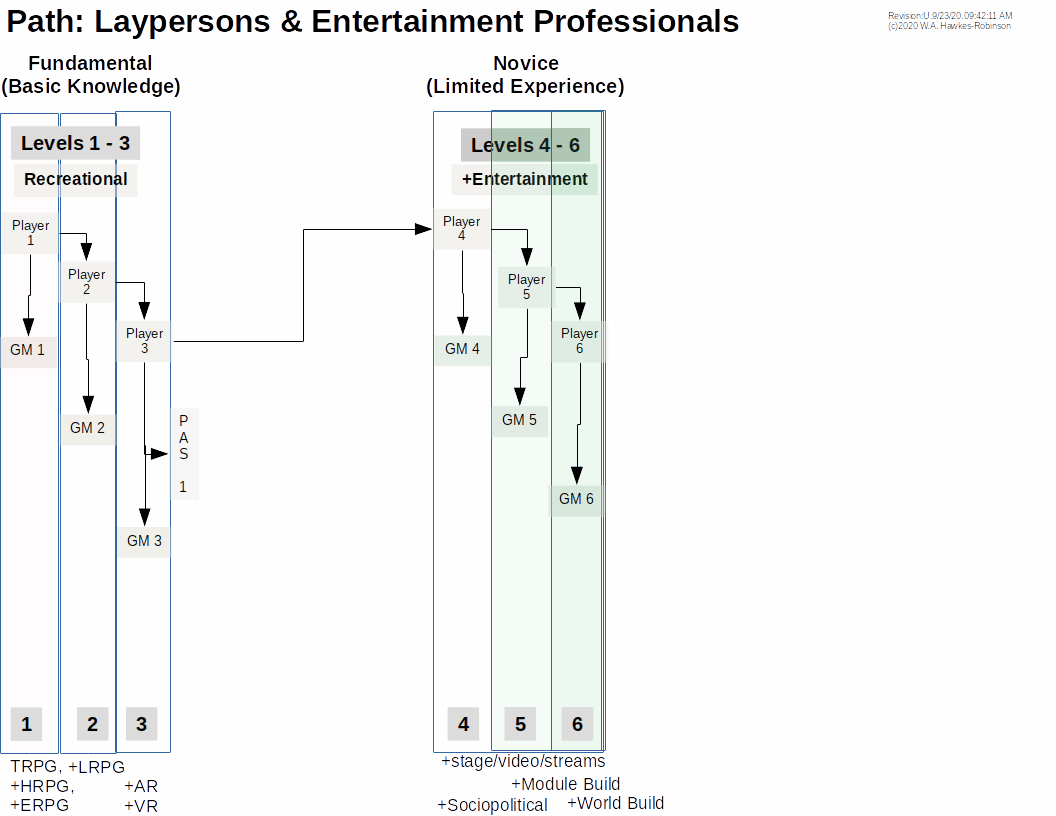
Intermediate (Practical Application & Theory)
RPG businesses for Recreational & Entertainment Professionals (levels 7-9)
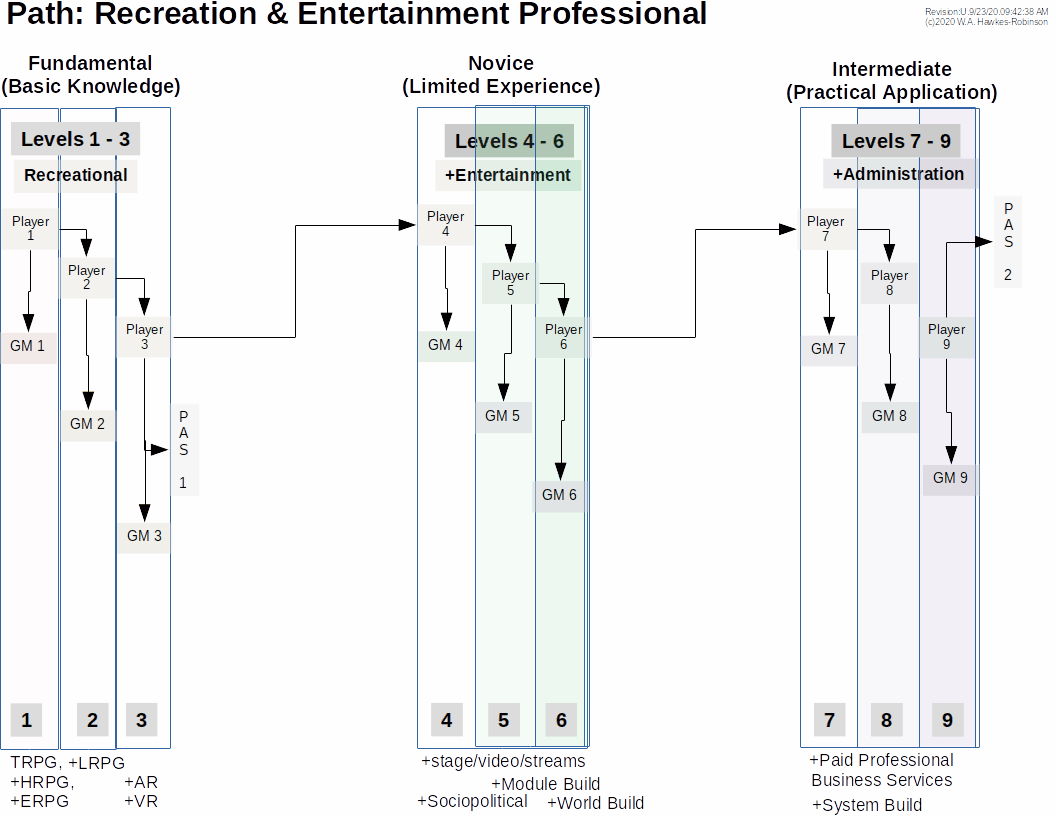
Expert (Recognized Authority)
Trainer for Laypersons as well as Recreational & Entertainment Professionals (level 10)
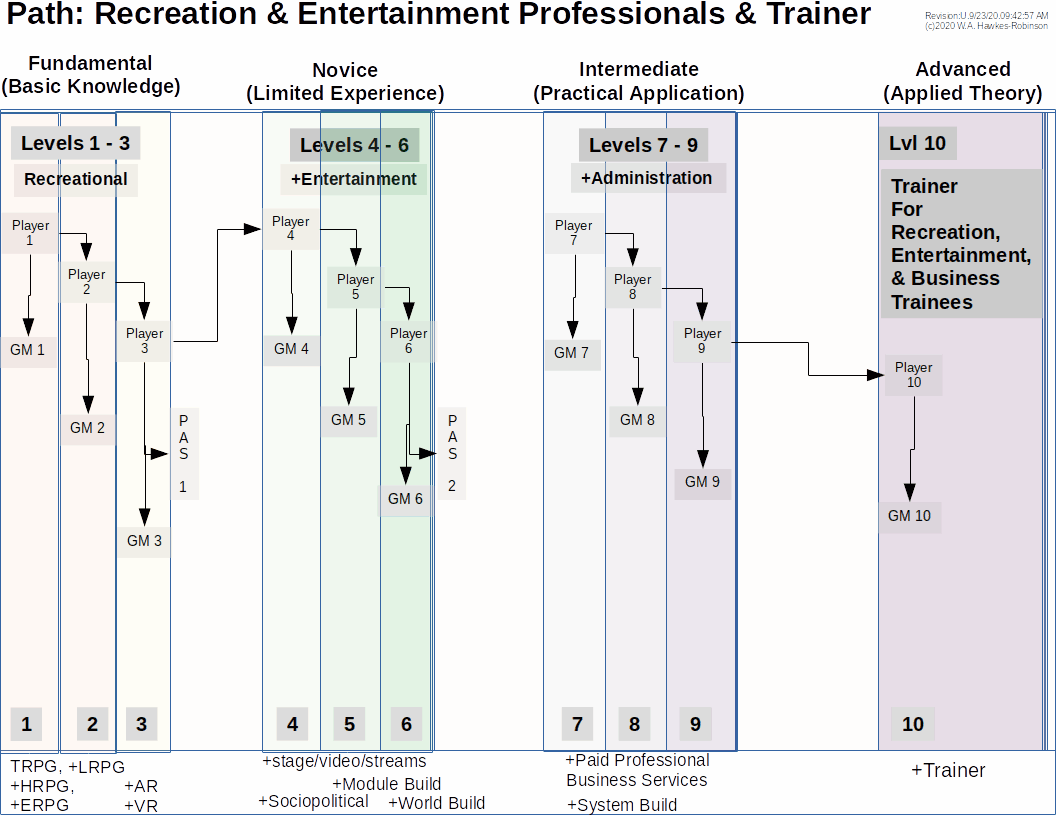
Advanced (Applied Theory)
Training for Educational Professionals (levels 11-13)
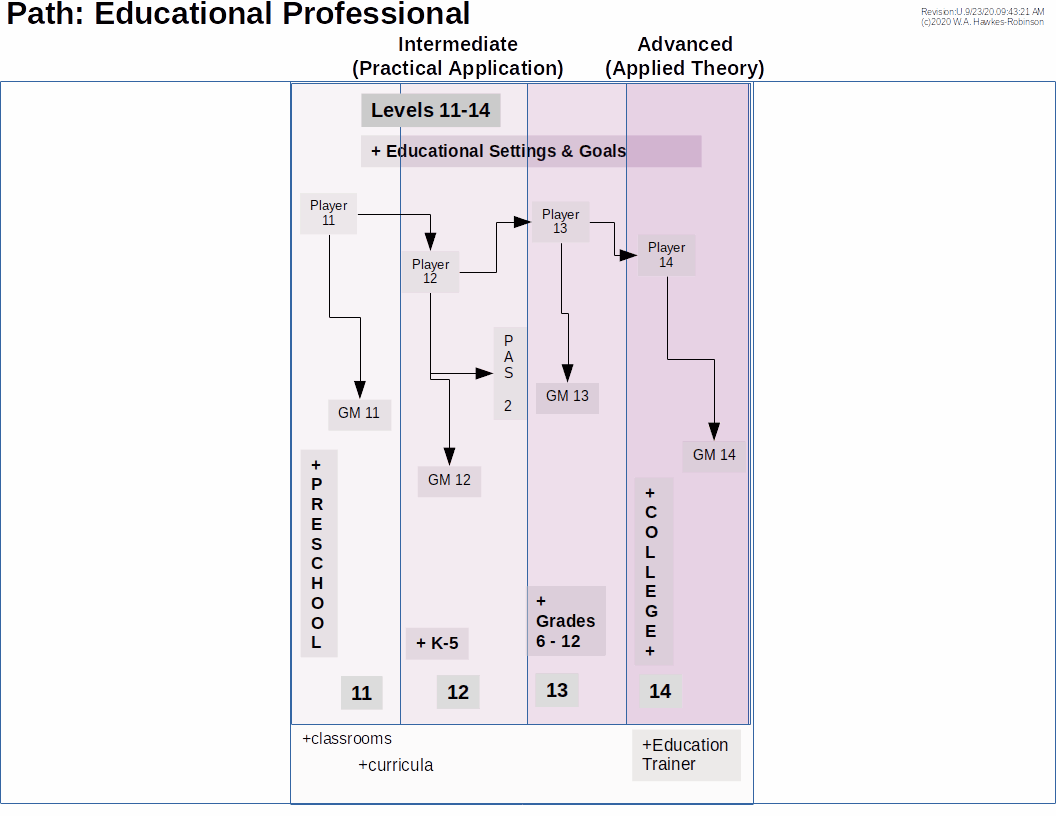
Advanced (Applied Theory)
Training for Therapeutic Professionals (levels 15-18).
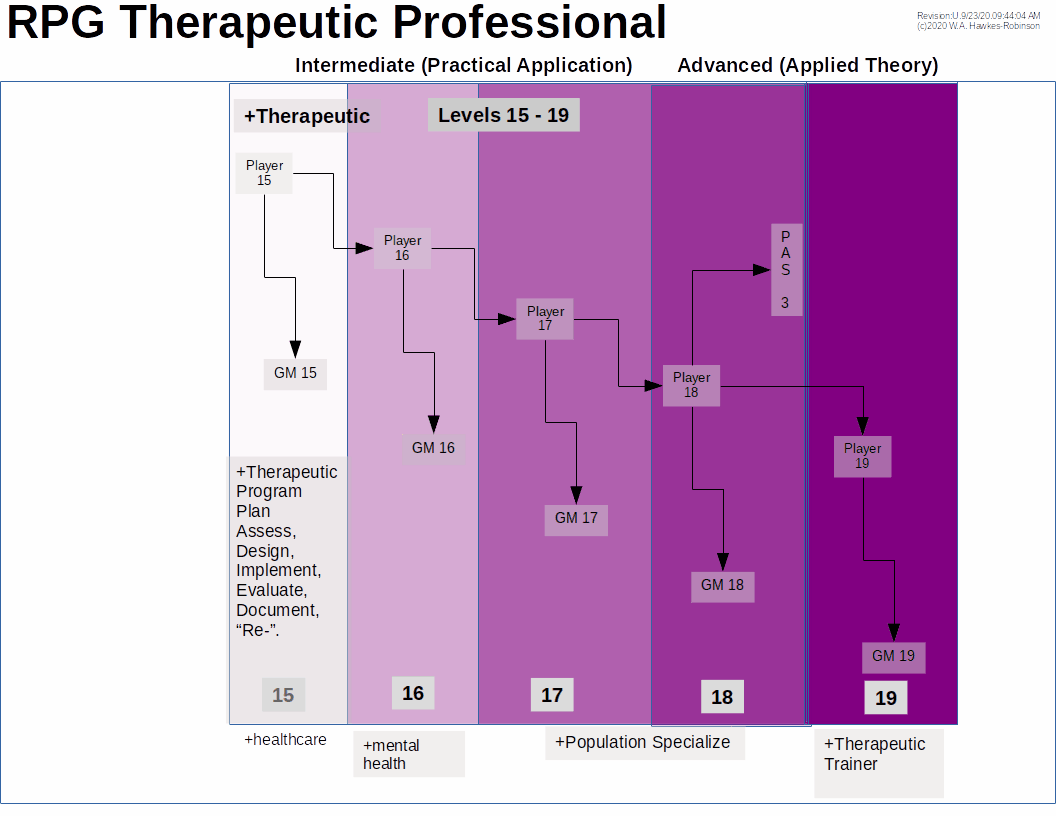
Expert (Recognized Authority)
Trainer for all Professionals (level 20).
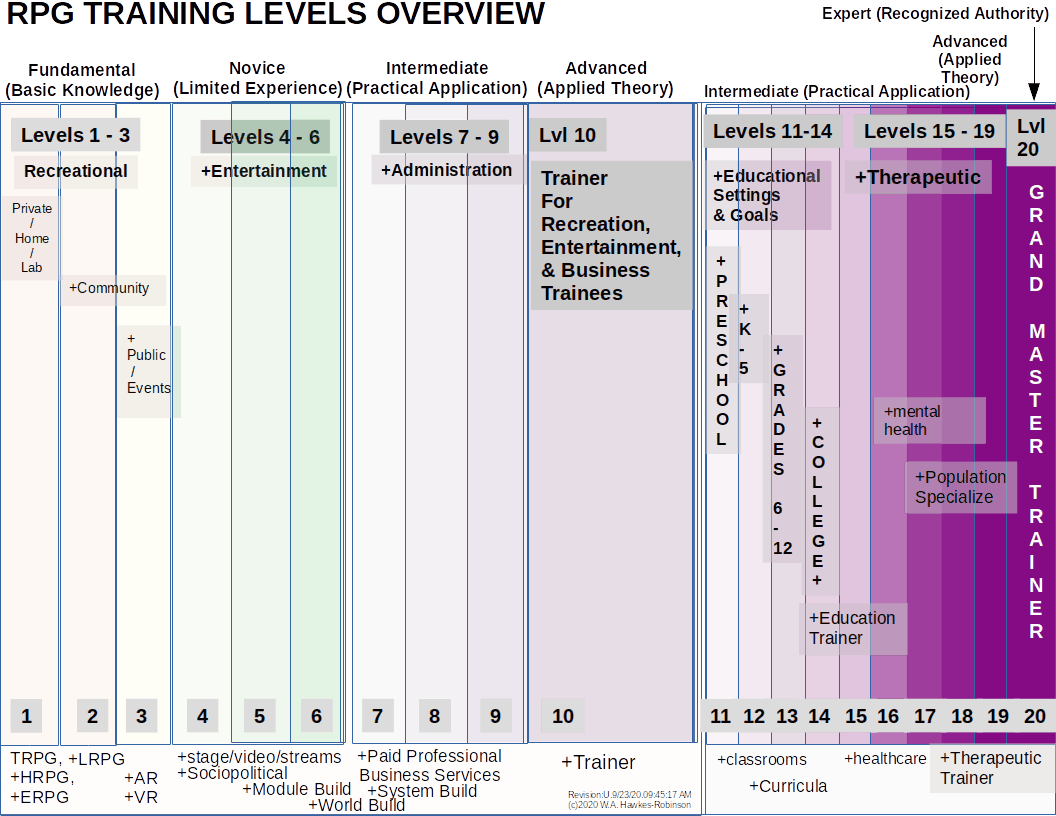
Overview of Some Key Topics and Areas of Knowledge
-
Code of Conduct
-
Consent
-
Context
-
Introduction to The RPG Model(s) and 4 Formats
-
IF: CYOA: (for example, something like "Abominable Snowman") and other IF: for example "Chooseable Path: To Be Or Not To Be" and/or others
-
Intro to APIE, Assessment
-
GIAT
-
CARBE
-
Play Styles, Player Preferences, Stereotypes, and Archetypes
-
RPG Format HRPG: SAB1: example like "Firetop Mountain"
-
TRPG Core Concepts Part 1
-
History of RPG and Moral Panic
-
Assignments: BFRPG SAM1 "Primus Casus: Iter Ad Lacum" (journey to the dungeon)"
-
SAM2 "Secundus Casus: Carcere Serpere (dungeon crawl)"
-
Introduction to Audio RPGs.
-
APIE: Planning
-
Gaming preparation and hygiene
-
Introduction to TRPG Format and Core Concepts Part 1
-
Intro to TR Ability Model and RPG Ability Model
-
Barriers to Entry
-
ntroductory Play,
-
Neuroscience of Learning
-
BFRPG Solo Adventures 1 and 2 Discussion
-
BFRPG: Group Adventure 1: GM's First Adventure ("ludum domini primi coetus casus: alta in cuniculis" (Game Master's First Group Adventure: Deep in the Tunnels"))
-
APIE: Implementation
-
Introduction to TRPG Format & Core Concepts Part 2
-
Differences in effects of "Old School" and "New School" RPGs
-
BFRPG Group Adventure 2: GM's Second Adventure ("Ludum Domini Secundi Coetus Valebat: Non Omnes Vagantes Aberrarunt. " (Game Master's Second Group Adventure: Not all those who wander have lost their way." ))
-
APIE: Evaluation
-
Participant Feedback Forms
-
Introduction to Bleed, BFRPG Group Adventure 3 (along the lines of "The Search of Grimfall" or similar) & related topics
-
APIE: Documentation
-
Introduction to TRPG Format & Core Concepts Part 3
-
Basic Bleed management Voicing part 1
-
BFRPG Group Adventure 4 (along the lines of A Temple of Slides and Stairs" or similar) and related topics
-
Introduction to Gaming Accessibility
-
Turn Management Tips and Tricks
-
Voicing part 2
-
Accessibility: Aphantasia and similar
-
BFRPG Group Adventure 5 part 1 "Vault of Thaire" or simiilar.
-
Use of RPGs for Entertainment Goals
-
The Open Science by Design approach
-
RPG Research Workflow
-
RPG Therapeutics LLC Workflow
-
"Good" and "Bad" forms of Escape
-
The LRPG Format, Pros and Cons of LRPG
-
NTYE Adventures 1 , 2, & 3.
-
Effects of technologies on TRPG experiences
-
VTTs
-
Introduction to Labyrinth RPG (or similar).
-
Electronic RPGs ERPG Format Part 1 (NWN Prologue Tutorial or similar)
-
Group Dynamics
-
Peer Review
-
Accessibility in Gaming Continues
-
Game Violence,
-
ERPG Format Part 2 (NWN Group adventure part 1)
-
Screen Time
-
xR, AR, MR, VR, etc.
-
Accessibility and technology
-
BCI
-
Gamification
-
Health-focused games
-
ERPG Format Part 3 (NWN group adventure part 2)
-
Interaction Patterns
-
Gamer Floaters
-
Ethical Game Design
-
Electronic GM Tools for ERPGsd
-
Introduction to states of immersion and Flow State for individuals and groups, as well as neural synchronization
-
Recent D&D (Saltmarsh or similar) part 1
-
Bleed Management and Flow Management Continued: D&D (Saltmarsh or similar) part 2
-
GM Styles & Beneficial Illusions
-
RPGs and Activity Interaction Patterns
-
D&D (Saltmarsh or similar) part 3
-
TR Enhanced RPG Experience
-
D&D (Saltmarsh or similar) Part 4
-
Behavior Guidance Rules
-
Middle-earth RPGs part 1: AiMe/LotR (Eves or similar)
-
Behavior Guidance Rules Continued Middle-earth RPGs part 1: TOR (Eves or similar)
-
Behavior Guidance Rules Continued
-
DWAITS part 1 (Arrowdown or similar)
-
Risk Factors
-
Explanatory Styles
-
DWAITS part 2 (Arrowdown or similar)
-
Hybrid RPGs
-
Communication Styles
-
Dark Crystal (or similar) Introduction
-
Use of RPGs for Educational Goals
-
Resilience
-
TPK, Existential Crisis, and Processing Discussions
-
Top Secret RPG part 1 or similar
-
Resilience
-
Effects of Isolation
-
Grit
-
Top Secret RPG part 2 or similar
-
Use of RPGs for Therapeutic Goals
-
Effects of Social Isolation
-
Professional and Legal Issues
-
Individual and Group Identity and Belonging
-
Program Participant Discharge/transition planning
-
Top Secret RPG part 3 or similar
-
Applied Gaming Session: "Golden Sky Stories"
-
"Kids on Bikes", or similar Introduction
-
Completing Remaining Requirements
-
Preparing for the Final Exam.
Certification Completion Requirements (Example for Level 1 Full Certification)
-
Pass mandatory background check
-
Complete all theory training requirements
-
Complete all in-class applied gaming sessions (6-12 games per level of training)
-
Complete all self-study assignments (typically 15-90 minutes of work per week)
-
Complete all journal entries
-
Complete all written/recorded essays
-
Complete all observer, player, and GM logs and evaluations
-
Complete all volunteer hours requirements "giving back to the community" (this is very flexible)
-
Complete all supervised, peer-reviewed, community sessions
-
Complete all training, volunteering, and peer-review hours before eligible to take final exam
-
Minimum in-class training hours: 208 (104x2)
-
Minimum Supervised & Peer-reviewed In-Lab Applied Gaming Hours: 130 (52x2.5)
-
Minimum Supervised Community Volunteering/Applied Gaming Hours: 96 (12x8)
-
Complete all section and practice quizzes with 100% score.
-
Complete required course practicum/paper/program with 80% or higher score.
-
Complete final exam with 90% or higher, to receive diploma, and online verification listing.
-
Maintain relevance with Continuing Education Units (CEUs) through Approved Service Providers, approved volunteering, events, workshops, and other approves methods.